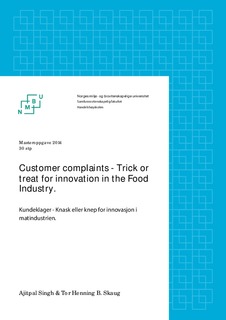| dc.contributor.author | Skaug, Tor Henning B. | |
| dc.contributor.author | Singh, Ajitpal | |
| dc.date.accessioned | 2014-08-15T10:56:04Z | |
| dc.date.available | 2014-08-15T10:56:04Z | |
| dc.date.copyright | 2014 | |
| dc.date.issued | 2014-08-15 | |
| dc.identifier.uri | http://hdl.handle.net/11250/217314 | |
| dc.description.abstract | Sammendrag
Tema for denne masteroppgaven er innovasjon i matindustrien. Tidligere forskning viser at norsk matindustri opplever økt konkurranse fra utlandet og derfor blir innovasjon sett på som nøkkelen til å overkomme denne utfordringen. Avhandlingen studerer hvordan kundeklager kan skape grunnlag for innovasjon og det rettes fokus mot verdi i kundeklager. Med utgangspunkt i tema, bakgrunn og formål ble følgende problemstilling utledet:
«Hvordan kan kundeklager skape grunnlag for innovasjon i matindustrien?»
For å belyse studiens problemstilling er det benyttet et kvalitativt casestudiedesign hvor
datainnsamlingen ble gjennomført hos to caseenheter med totalt ni informanter. Begge
caseenhetene opererer innen samme næringsgruppe (Bakervarer) i matindustrien.
Hovedfunnene i studien viser at det forekommer lite innovasjon basert på kundeklager, men det kommer frem at kundeklager har blitt brukt som innovasjonsgrunnlag for utvikling av nye produkter. Videre viser det seg at kundeklager også har ført til endringer på eksisterende produkter, noe som kan bli sett på som inkrementelle innovasjoner. Utfordringene knyttet til kundeklager som grunnlag for innovasjon er lønnsomheten, og det å lytte til kundeklager kan gi varierte resultater. Caseenhetene handler på bakgrunn av flere kilder til markedsinformasjon fremfor en enkelt kilde som kundeklager ved produktutvikling og innovasjon. Beslutninger tas med forankring i markedsinformasjon.
For videre forskning hadde det vært interessant å undersøke hvordan en bedrifts
organisasjonskultur kan påvirke spredningen av kundeklager og eventuelle
spredningsbarrierer. Flere av informantene begrunner svarene med bakgrunn i
organisasjonskulturen. Det ville også vært spennende om andre forskere kunne gjennomført samme studie i en annen næringsgruppe i matindustrien, for å undersøke om forskerne kan komme frem til lignende resultater. Videre, ville det vært av interesse for ytterligere forskning på området å undersøke hvordan maktbalansen i matindustrien kan påvirke bedriftenes mulighet til å bringe nye innovasjoner til markedet.
Abstract
The topic of this master thesis is innovation in the Food Industry. Previous research proves that the Norwegian Food Industry experiences increased international competition and therefore innovation is the key to overcome and deal with this challenge. This study examines how customer complaints can create a basis for innovation and the study is focusing on the value in customer complaints. Based on the topic, background and the object for this study the following problem to be addressed was introduced:
“How can customer complaints create a basis for innovation in the Food Industry?”
To highlight the problem to be addressed the study utilizes a qualitative case study design where the data collection was collected from two case units with the total amount of nine informants. Both case units operate in the same Industry Group within the Food Industry.
The main findings in the study shows that the level of innovation based on customer
complaints is low, however customer complaints have been used as a basis for innovation and for development of new products. The results also shows that customer complaints have led to changes on already existing products, which can be describe as incremental innovations. The challenge with customer complaints as a basis for innovation is the profitability and the results shows that by listening to customer complaints can result in different outcomes. The case units in this study utilize different sources for market information rather than one single source of market information for product development and innovation. The decisions are rooted in market information.
For further research, it would be interesting to examine how the organizational culture can affect the transmission of customer complaints and the potential barriers for transmission. Several of the informants justify their answers in the organizational culture. It would also be interesting if other researchers could carry out the same study in another Industry Group in the Food Industry to investigate whether they can achieve similar results. Another suggestion for further research in this field would be to examine how power balance in the Food Industry can affect the companies’ opportunities to bring innovations to the market. | nb_NO |
| dc.language.iso | nob | nb_NO |
| dc.publisher | Norwegian University of Life Sciences, Ås | |
| dc.subject | VDP::Samfunnsvitenskap: 200::Psykologi: 260::Utviklingspsykologi: 265 | nb_NO |
| dc.subject | Innovasjon | nb_NO |
| dc.subject | Kundeklager | nb_NO |
| dc.subject | Markedsorientering | nb_NO |
| dc.subject | Absorberende kapasitet | nb_NO |
| dc.subject | Innovation | nb_NO |
| dc.subject | Customer complaints | nb_NO |
| dc.subject | Market orientation | nb_NO |
| dc.subject | Absorptive capacity | nb_NO |
| dc.subject | VDP::Samfunnsvitenskap: 200::Økonomi: 210 | nb_NO |
| dc.title | Kundeklager : knask eller knep for innovasjon i matindustrien | nb_NO |
| dc.title.alternative | Customer complaints : trick or treat for innovation in the food industry | nb_NO |
| dc.type | Master thesis | nb_NO |
| dc.source.pagenumber | 59 | nb_NO |
| dc.description.localcode | M-EI | nb_NO |
